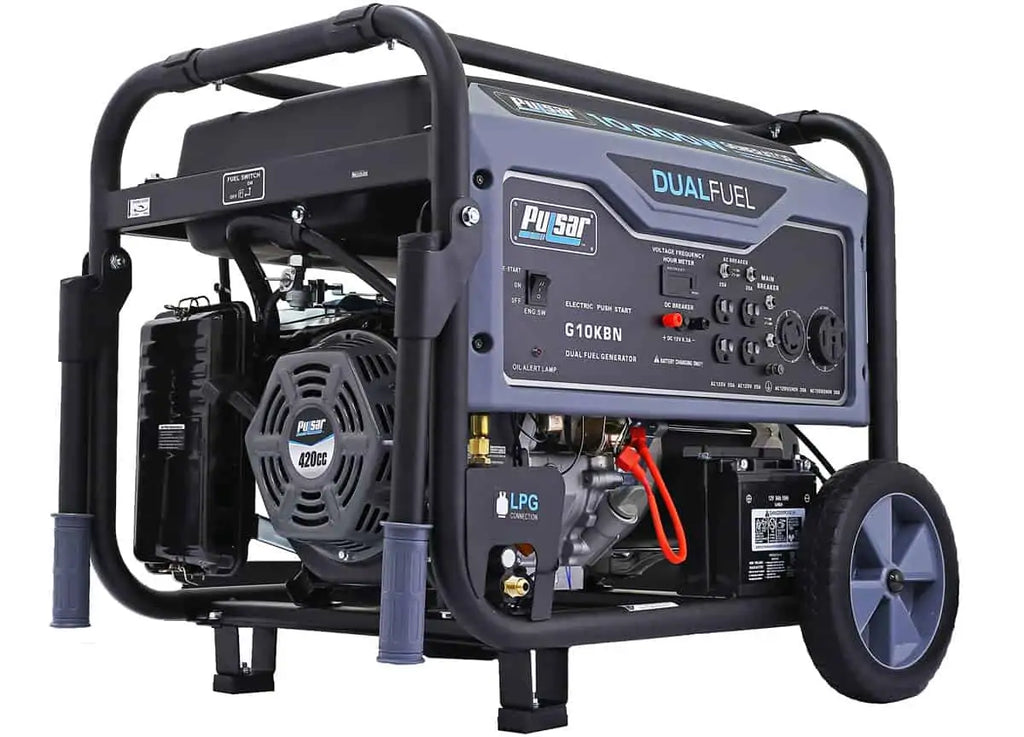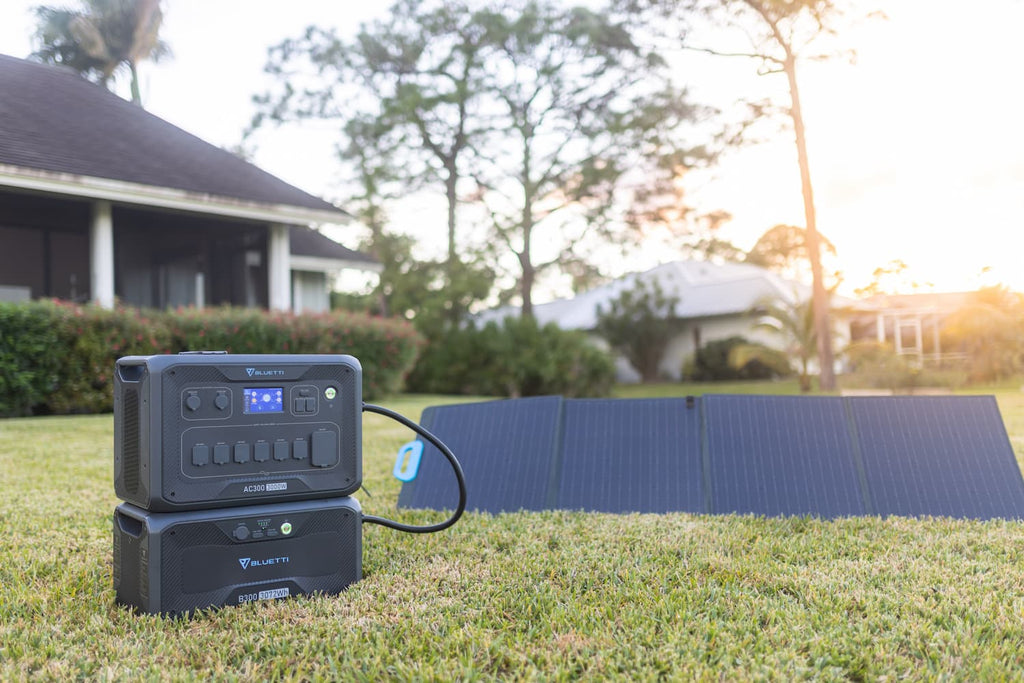Your cart is empty
Shop our productsA generator is an ideal backup power solution that can power most of your appliances. There are many types among them dual fuel and solar generators. Each has its applications, advantages, and disadvantages. Should you go for a dual fuel generator or settle for a solar generator? Let’s find out.
What Is a Dual Fuel Generator?

As the name suggests, there are generators that can operate on two fuel types. Most common dual fuel generators operate on gasoline and propane, but you can find models that use natural gas and diesel.
Unlike a bi-fuel generator, a dual fuel unit allows you to use both fuels simultaneously. With the former, you can only use one fuel at a time. You can however do the same with dual fuel generators.
While they have gained traction in the last decade, experts have been experimenting with dual fuel technology for centuries. In fact, the technology dates back to the early 1890s with Rudolph Diesel being one of the most notable pioneers.
Their versatility has made them become a popular option for most homeowners and businesses. They allow you to use two different fuel types while producing ample energy to power your appliances. It makes them an ideal option for running the whole house for those living off the grid.
How Does a Dual Fuel Generator Work?
As mentioned, dual fuel generators run on two different fuel types. In short, they have two sources of power. If you choose one at a time, the other becomes a backup option, further bolstering its reliability. They are easy to operate as you only need to consult the manual.
You can fill both tanks with the same fuel or use different types for each. Once full, you can connect the cable from the generator to your home. The best part is that when one fuel runs low, the generator will automatically switch to the other fuel supply.
This mitigates the manual work that is switching between fuel supplies. That said, you should ensure that the tanks are full to avoid damaging the generator coils. If they get damaged, they will lose their magnetism, preventing the generator from restarting automatically.
Furthermore, low fuel can reduce heat in the cylinder, which can lead to leakage of fuel and oil deposits. Dual fuel generators should be run a few meters from your house since they produce toxic gasses. In fact, you should liaise with your local authority to determine whether it is legal to install dual fuel generators.
Pros and Cons of Dual Fuel Generator
So why should you opt for a dual fuel generator? Let’s find out.
Pros
1. Fuel-efficient
Dual fuel generators have increased fuel efficiency as they tend to switch from one type to another depending on the power needs. For example, a natural gas and diesel generator will utilize diesel during ignition and gradually switch to natural gas when running.
Since natural gas produces more power per unit and burns for longer, you’ll increase fuel efficiency as opposed to using a bi-fuel generator. There are in fact generators that can run for over 10 hours on propane. So, if you live off the grid and want to save on fuel bills, consider a dual fuel generator.
2. Eco-friendly
While not as clean as solar generators, dual fuel generators are more environmentally friendly than bi-fuel or single-fuel generators. They are equipped with a high-efficient engine that reduces the amount of greenhouse gas produced. Furthermore, propane is more eco-friendly than diesel.
3. Versatile
As mentioned, dual fuel generators can use different types of fuel. This is one of the main reasons why you should get one. For example, if it’ll be operating in hot conditions, you can use propane. Likewise, if it will be operating in cold conditions, gasoline is your best bet.
If there's a lack of one fuel type, you can seamlessly use another type and power your house. Moreover, it is easier to store propane at home, which you can use in the event of an emergency.
Cons
Like other generators, dual fuel units come with drawbacks, let’s look at them.
1. Storage Challenges
If you’ll be using gasoline as a fuel source, you might run into storage issues. Gasoline has a shorter lifespan than other sources, meaning you’ll have to use it within a few months of purchase.
If you want to store it for extended periods, you’ll need to use a gas stabilizer which can be expensive. Besides, most cities limit how much gasoline you can store in your home. Ideally, most set a maximum of 95 liters.
Propane on the other hand is more stable and can last for decades without becoming unstable.
2. Maintenance Costs
There’s increased maintenance when using two different fuels. You’ll need to inspect the engine and the tanks to remove any residue. You’ll also need to ensure the pipes are not clogged.
What Is a Solar Generator?
A solar generator is a device that includes portable solar panels, solar batteries, and an inverter. The solar panels capture power from the sun while the solar batteries store excess power. The inverter allows you to connect the generator to any appliance.
While they are popular with outdoor activities such as hiking, boating, RV living, and camping, they are also popular with most house owners. Solar generators do not produce harmful gasses when converting sunlight to energy. This makes them the cleanest source of power globally.
Typical solar generators have different ports which you can use to recharge. For example, the BLUETTI AC500 + B300S has 6 methods. You can use the car cigarette lighter port, an AC outlet, lead-acid battery, a generator, solar panels, and supports dual charging.
Like most solar generators, it has a high capacity of 3,072Wh which can be expanded to 18,432Wh if you need extra power.
How Does a Solar Generator Work?

A solar generator generally captures power from the sun, converts it to energy, and stores the excess in solar batteries. Here’s how a solar generator works:
- The solar panels capture sunlight and convert it to DC electricity by the help of the PV cells. The electricity passes through the charge controller.
- The charge controller regulates how much energy reaches the batteries. It ensures the right amount of current reaches the batteries to avoid damaging them.
- The battery stores all or extra solar energy if you are using the solar panels as the batteries charge.
- The built-in inverter then converts the stored energy into AC electricity that most devices and appliances use.
Pros and Cons of Solar Generator
Pros
Why should you install a solar generator? Let’s find out
1. Eco-Friendly
One of the main benefits of using a solar generator is its eco-friendliness. Conventional generators such as diesel units produce greenhouse gasses that pollute the environment, leading to devastating climate change consequences.
Solar generators, on the other hand, do not produce harmful gasses when converting sunlight into electricity. Besides, they are non-toxic, meaning they do not produce gasses that impact one's health, which is the case with the BLUETTI EP500Pro Solar Power Station
2. Quiet Operation
Another reason to opt for solar generators is their quiet operation. Gas and diesel generators tend to be noisy since they have many moving parts. Solar generators have no moving parts hence their noiseless operation.
3. Longer Lifespan
Solar generators, especially those equipped with LiFePO4 batteries have a longer lifespan. For example the BLUETTI AC300 + B300 Solar Generator has a lifespan of 10 years. The system with a capacity of 3,072Wh will continue providing ample power for a decade. This is unlike lead-acid batteries that last for less than five years.

4. Convenient
Solar generators provide much-needed convenience than other types of generators. This is thanks to their portable and lightweight design. You can have your solar system running in minutes. This is unlike conventional generators that need specialized installation.
Furthermore, some come with an LCD control panel, ample output ports, and a smart control feature.
5. Easy to Maintain
One of the chief benefits of using solar generators is their ease of maintenance. In fact, they are maintenance-free units. They have no moving parts, meaning you don’t have to worry about lubrication. The only maintenance is cleaning the your portable solar panels, which does not require the input of an electrician
Cons
Some drawbacks include:
1. Sensitive to Temperature
Most solar generators are sensitive to long exposure to intense heat. It leads to faster battery degradation. But with ample thermal insulation and battery management systems, premium generators can perform reasonably well under high temperatures.
2. High Initial Investment
Unlike conventional dual fuel generators, solar generators command a higher initial investment. Most generators will range from $2000, which can be a turn off for people on a budget.
3. Limited Power Supply
Smaller and cheaper solar generators have a limited power supply. Most can power small devices such as phones only. Most do not possess the capacity to power an entire household. This is unlike gas generators that can power an entire house for hours.
Dual Fuel Generator Vs. Solar Generator: How to Choose?
Which is better: a dual fuel generator or a solar generator? Here’s a comparison between the two:
|
Dual Fuel Generator |
Solar Generator |
|
|
Power output |
Lower power output |
High power output |
|
Fuel options |
Can run on multiple fuel sources such as gas and propane |
Does not require fuel |
|
Noise level |
Produce more noise during operation |
Are noiseless during operation |
|
Portability |
Heavier and larger |
Compact and lightweight |
|
Emissions |
Produce toxic gasses such as carbon monoxide |
Have zero emissions |
|
maintenance |
Increased maintenance |
maintenance-free |
Making Your Choice
So, should you buy a dual fuel generator or a solar generator? Well, if your energy needs require high power output, consider buying a dual fuel generator. Otherwise, a solar generator will be the best choice.
Shop products from this article
You May Also Like

What Does a 30% Federal Solar Tax Credit Mean and How to Apply?
Governments around the world are offering programs that encourage homeowners to switch to solar energy. Among the most notable programs is the 30% Federal Solar Tax Credit. It reduces your...

Deadly Flooding Devastates U.S. South and Midwest — What You Need to Know























































































































































































































































